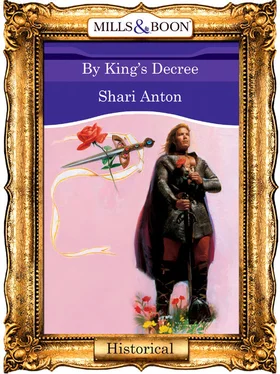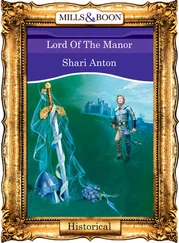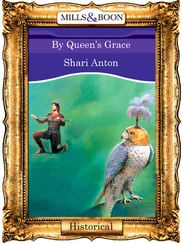Gerard inwardly winced, facing the inevitable. He must marry. He should have married years ago, for both Daymon’s sake and Wilmont’s.
His father hadn’t shirked his duty to find a bride for his eldest son. Gerard vaguely remembered talk of a marriage contract to the daughter of another baron, but the girl hadn’t survived childhood. Several years later, Father had bargained for another maiden, but for some reason that betrothal hadn’t come about.
Any number of females would vie for the honor of becoming mistress of Wilmont. The woman he settled on must be of good blood, and able to run a household. She needn’t possess flawless beauty or a large dowry, though he wouldn’t mind a comely wife or additional funds or land.
More important to him than wealth or beauty was that his wife be capable of affection. He most definitely wanted a mate who wouldn’t balk at sharing the marriage bed and producing heirs. He didn’t need love—the emotion having no place in a good marriage contract—merely the woman’s acceptance of her place in his life.
Gerard raised Daymon to arm’s length into the air and smiled at the boy’s delighted squeal.
Acceptance. Was there a woman in all of England or Normandy who would willingly open her heart to Daymon, despite his bastard birth?
As Gerard lowered his son back into his arms, he saw Lady Ursula across the hall. Her glower set his resolve.
Such a woman must exist. He need only find her.
But first he would deal with Basil of Northbryre. Nothing must interfere with bringing that whoreson to his knees.
Ardith knelt on the dirt floor of the sleeping chamber. In front of her swirled the most exquisite cloth she’d ever had the pleasure to pierce with a needle. As her sister Bronwyn turned in a slow circle, the emerald silk flowed past in soft, shimmering waves.
“Halt,” Ardith ordered, then adjusted a holding stitch along the gown’s hem.
“Oh, Ardith, Kester will be so pleased,” Bronwyn stated with a breathless quality in her voice.
Ardith smiled. Bronwyn’s husband, Kester, was besotted with his wife. Knowing how much new gowns pleased Bronwyn, he sought exotic fabrics as gifts. Kester had bought this rare silk from an Italian merchant, right off the ship.
Bronwyn had then rushed to Lenvil. Though she had servants to make her gowns, Bronwyn always returned home to Ardith when she wanted something special. According to Bronwyn, this gown would make its debut at Christmas.
“If you are pleased, Kester will be delighted. Now, turn once more.” She again inspected her handiwork before declaring the session finished.
Ardith stood, flicking pieces of rushes and dirt from her brown, coarse-wool gown. Though she owned two lovely gowns—a yellow wool for winter and a light green linen for summer—she rarely wore them unless visitors were expected. For everyday chores, peasant-woven cloth served best.
She pushed aside Bronwyn’s honey-blond braid to undo the lacing on the gown. “Now, you must finish your story.”
“Oh, I almost forgot. Well, as I said, King Henry sent Kester to meet the pope’s envoy. Kester met the ship at Hastings and brought the priest to overnight at our holding before going on to London.” Bronwyn slipped out of the emerald silk and donned a blue wool. She continued, “From what I hear, Pope Paschal is very angry with King Henry, to the point of threatening excommunication.”
Ardith desperately wanted to hear more of the envoy and the king. Having lived her entire ten and seven years at Lenvil, she hungered for news of life beyond the manor. But the jingle of tack and the thud of horses’ hooves cut short the conversation.
“Father has returned earlier than I expected,” Ardith remarked. “No doubt his leg hurts and he cut his inspection short. Would you fetch him a goblet of warm wine? The brew usually eases his pain.”
“How do you bear the grouch?” Bronwyn asked, placing a veil of sheer blue linen over her hair, securing it with a silver circlet.
Ardith shrugged. “’Tis the change of season affecting his mood. Once winter sets in and he stays off his leg, Father’s temper will improve.”
“Why does he bother to inspect the fields once the harvest is in? Heavens, why would anyone want to look at nothing but clots of dirt? You could tell him which fields to plant next spring and which to leave fallow.” Bronwyn suddenly smiled. “Ah, I see. Father thinks he decides on his own, does he?”
“Nor will I have him think otherwise,” Ardith warned.
“As you wish, but do not leave me alone with him overlong. He will ramble on about oats and cabbages.” With a sigh, Bronwyn turned and left the chamber.
Shaking her head in amusement, Ardith gathered up thread and needle and scraps of cloth, thinking of how different her life was from that of her sisters. One by one the girls had left home. Edith had entered the convent; the others had all married. By default, Ardith became the lady of the manor, if not in title, in practice. Someday, Corwin would marry and bring his bride to Lenvil. But since neither Harold nor Corwin appeared eager for that event, her place at Lenvil was secure for a while longer.
For forever, Ardith hoped, and to ensure her place she’d studied Elva’s herb lore. She’d learned which herbs soothed a roiling stomach, which numbed an aching tooth, how to mix powders for headaches and salves for burns. She could poultice a wound and even act as midwife.
Surely Corwin would allow her to stay at Lenvil for those talents alone, as Harold had allowed his sister to remain near the manor. Had Elva not become outlandish with her heathen rituals—tossing animal bones and muttering pagan chants—Harold might have allowed Elva to live in the manor. But the day Elva had slit open a piglet to read the entrails was the day Harold had banished his sister to a hut in the village.
Though Ardith longed for a proper home of her own, she knew it folly to dream. She placed a hand over her belly, over the ugly scar marring her flesh, sealing her future. Elva had explained to a bewildered girl that though the wound wasn’t deep enough to kill, the damage was severe.
Ardith could never marry because she could bear no man an heir.
Ardith shook her head. Why was she thinking of her barrenness now? Why did she let Bronwyn’s visits, witnessing her sister’s happiness, bring on these bouts of self-pity?
She could hear Bronwyn’s light laughter and the sound of low, male voices coming from the hall. As she passed under the arch separating the two rooms of the manor, she saw not her father, but Corwin.
Her delight wiped away the dark mood. Without thinking, seeing only her beloved twin, Ardith squealed his name and ran across the room. Corwin barely had time to brace his feet before Ardith flung her arms around his neck.
From several yards away, Gerard watched Ardith gleefully sprint into Corwin’s open arms. He recognized her at once, though he hadn’t seen her for several years. There was no mistaking her deep auburn hair and vivid blue eyes.
Corwin lifted his sister and swung her around. Gerard barely heard the soft laughter of those around him as he watched the twins embrace. He was remembering the one time he had swept. Ardith from her feet, held an adorable bundle of little girl in his arms.
Ardith had blossomed into a beautiful young woman.
She was gowned in coarse wool that hugged her ripe bosom and tiny waist before flaring over the curve of rounded hips.
Her smile alone could lift a man’s spirits. Ardith’s smile for Corwin caught not only her mouth and eyes, but lighted her entire face.
The tug in the area of his heart he attributed to envy. Of all the women in his life, from court ladies to peasant wenches, no woman had ever greeted him with such abandon.
Читать дальше












